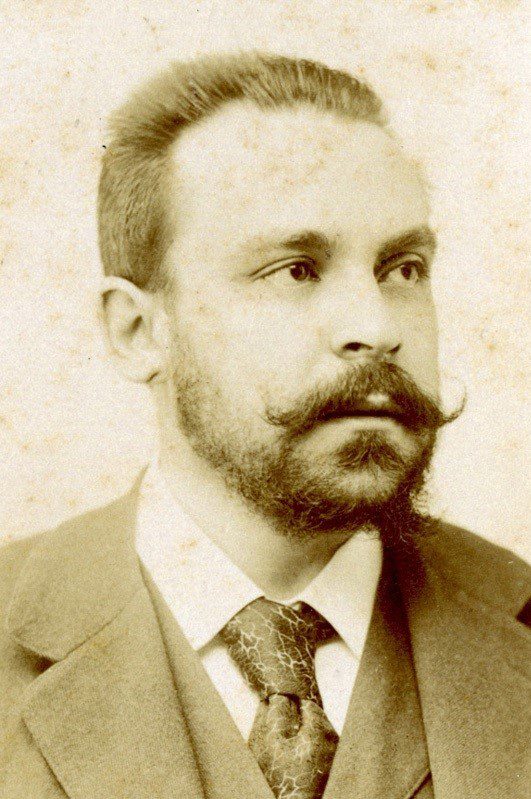Eli Ehrenpreis
Skokie, Illinois, United States
 |
|
Ruggero Oddi in 1900 during his post as acting director of the Physiological Institute of Genoa. Referenced in Alexander Rollett Letter Edition, L.2629. |
When Ruggero Oddi (1864–1913) was a medical student at the University of Bologna, he performed studies detailing the physiology of the biliary sphincter. This work became Oddi’s legacy, setting the stage for modern biliary and pancreatic clinical science. Without Oddi’s research, we would not have reached our current state-of-the-art in the diagnosis and management of pancreaticobiliary diseases.
While a complete picture of Oddi’s life after graduation is difficult to obtain, short biographic reviews have been published in the literature. History shows that Oddi rose to fame in the academic world and became the acting director of the Physiological Institute of Genoa at the age of twenty-nine in 1894. Beyond this, his life was characterized by personal and professional scandal, including the apparent use of opioids. Although he continued to publish regularly in the medical literature and wrote several high-quality books about medicine and nutrition, Oddi also apparently developed an obsessive belief in vitaline, an alternative therapy of questionable value and concerning toxicity. Ultimately, these factors resulted in disgrace and rejection by the established medical community.
According to several short biographies, Oddi then fulfilled a long-standing desire to move to “the Belgian Congo” to work as a primary care physician in 1901. However, in actuality Oddi was working as a physician in the under the brutal personal ownership of Belgian King Leopold II. Oddi no doubt witnessed horrific atrocities carried out against the natives of Congo, who were forced to work in the rubber fields. Mutilations, rapes, severe whippings, and executions occurred routinely and were supervised by lieutenants hired by the Belgian government. It is estimated that more than ten million deaths occurred during the existence of the Congo Free State.
Oddi was released from duties by colonial Belgian authorities after only five months because of his “inability to discharge his duties and mental instability.” However, being removed from working in the Congo Free State surely represents a badge of honor by contemporary standards. Furthermore, it can be assumed that Oddi’s outcries against the genocidal behavior of the Belgium colonists must have played a role in his removal. Alternatively, as a mentally fragile individual, he may have suffered a breakdown following exposure to the inhumanities for which he was an inadvertent firsthand witness. From 1902 to 1911, he apparently continued to publish and practice medicine in Italy, but became embroiled in controversy related to his promotion of vitaline. Sadly, Oddi spent the last two years of his life alone in Tunisia, where he died at the age of forty eight.
References
- Loukas M, Spentzouris G, Tubbs RS, Kapos T, Curry B. “Ruggero Ferdinando Antonio Guiseppe Vincenzo Oddi.” World J Surg. 2007 Nov;31(11):2260-5. doi: 10.1007/s00268-007-9019-1. PMID: 17902018.
- Ruggero Oddi. Wikipedia. Accessed Jan 31, 2023. https://en.wikipedia.org/wiki/Ruggero_Oddi.
- Modlin IM, Ahlman H. “Oddi: the paradox of the man and the sphincter.” Arch Surg. 1994 May;129(5):549-56. doi: 10.1001/archsurg.1994.01420290095014. PMID: 8185478.
- “Persönlichkeiten der Medizingeschichte” [“Personalities in medical history. Ruggero Oddi”]. Praxis (Bern 1994). 2014 Jul 23;103(15):919. German. doi: 10.1024/1661-8157/a001713. PMID: 25051941.
- Parquet RA. “Ruggero Ferdinando Antonio Guiseppe Vincenzo Oddi.” Acta Gastroenterol Latinoam. 2014 Mar;44(1):8. Spanish. PMID: 24847622.
- Belloni L. “Sulla vita e sull’opera di Ruggero Oddi (1864-1913)” [“On the life and work of Ruggero Oddi (1864-1913)”]. Riv Stor Med. 1965 Jul-Dec;9(2):151-9. Italian. PMID: 5326779.
ELI D. EHRENPREIS, MD, is a physician and researcher who has published close to 200 scientific journal articles and book chapters. His latest medical textbook, The Mesentery in Health and Disease, was published by Springer International. He has recently published several poems and short stories and often writes about his experiences in medicine. Dr. Ehrenpreis ended his clinical career after developing medical disabilities. He has three adult children, and lives with his wife Ana and two small dogs in Skokie, Illinois.
Winter 2023 | Sections | Physicians of Note

Leave a Reply